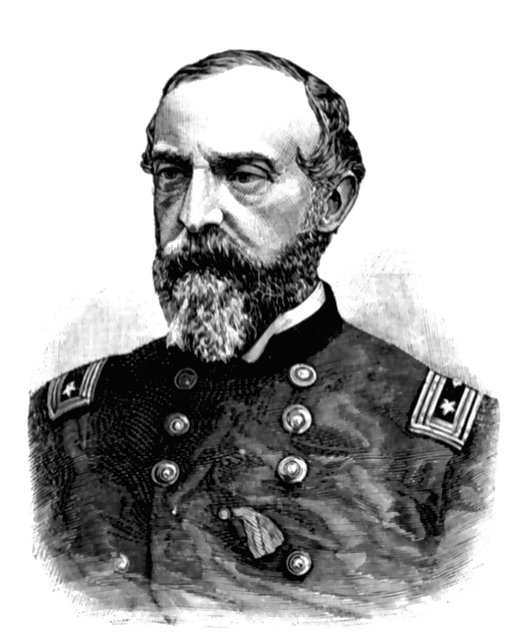
Date and Location
The Battle of Gettysburg occured in and around Gettysburg, Pennsylvania. The battle took place between July 1 and July 3 of 1863 (Britannica, "Battle of Gettysburg"). The Battle of Gettysburg is considered to be the turning point of the war, where the Union seized more control and more power. The battle also boosted the morale of the soilders and their families as the Union Army looked towards the rest of the Civil War (History, "Battle of Gettysburg").
General George G. Meade
General George G. Meade was born in Cadiz, Spain on December 31, 1815, but moved to America and attended the United States Military Academy. Meade served in the Mexican- American War, but it was not until the Civil War that Meade established himself as a successful military person. During the Civil War, he was promoted and gained control of the Pennsylvania Brigade and led in many critical battles. Meade was then given control of the Army of the Potamac. He was hesitant in facing General Robert E. Lee and the Confederate Army at Gettysburg in early July of 1863, but during the battle, he was able to fight off the Confederates and maintain control throughout the battle. When the Confederates retreated to Virginia, Meade did not pursue them, and Meade was heavily chastised by Lincoln. The Battle of Gettysburg is seen as Meade's most successful battle, but his failure to follow Lee and his army was seen as his most shameful act (Civil War Trust, "George G. Meade").
General Robert E. Lee
Robert E. Lee was born on January 19, 1807. Lee graduated from his class at Westpoint second in his class, and military success was expected of him. Lee spend 17 years focused on Corps of Engineers, but after his performance in the Mexican- American War, he was elevated to the rank of colonel. After being the superintendent at West Point, Lincoln offered him a job as commander of the Union Army, but Lee declined and accepted a job as a general of the Army of Northern Virginia. Lee had hopes of invading the North to establish legitamacy and gain the support of other countries. Instead, the Battle of Gettysburg ruined any chance of foreign help. Lee lost more than a third of his army during the Battle of Gettysburg. Following the defeat, Lee attempted to resign from the Confederate Army, but Jefferson Davis would not let him resign (Civil War Trust, "Robert E. Lee").
Summary of the Battle
On the first day of battle, July 1st, both the Confederate Army and the Union Army experienced large losses (History, "Battle of Gettysburg"). The Union Army established control of Cemetery Hill, Cemetery Ridge, and Culp's Hill (Gettysburg Foundation, "Battle of Gettysburg"). On the second day of battle, most of the fighting happened around Union strongholds such as Little Round Top, Devil's Den, the Peach Orchard, and the Wheatfield. Richard Sickles, commander of troops at Culp's Hill, and his men fought off the Confederates at Culp's Hill, as well as Little Round Top, Devil's Den, the Peach Orchard, and the Wheatfield. Sickles and his men maintained control at Little Round Top, but lost Devil's Den, the Peach Orchard, and the Wheatfield to the Confederates (History, "Battle of Gettysburg," Gettysburg Foundation, "Battle of Gettysburg"). On July 3rd, Lee sent George Pickett and 15,000 men to take over Cemetery Ridge, but three fourths of a mile of open field stretched before Cemetery Ridge, and this venture led to the ultimate defeat of the Lee's army in the Battle of Gettysburg. This began to be known as "Pickett's Charge" (History, "Battle of Gettysburg"). Lee's army retreated to Northern Virginia, but Meade and the Union Army did not follow (Civil War Trust, "George G. Meade").
Consequences of the Battle of Gettysburg
The Battle of Gettysburg is seen as the turning point for the Union Army in the Civil War (Brinkley, Alan, "Gettysburg"). It boosted the morale of the North, while crushing the morale of the South. Lee was especially crushed by this defeat and attempted to resign but was refused. A total of 51,000 soldiers died in the Battle of Gettysburg. Of that 51,000, 23,000 Union soldiers perished and 28,000 Confederate soldeirs were killed, which was more than one third of Lee's army (Robert E. Lee and the Southern Confederacy, "The Campaigns of Gettysburg and Mine Run"). At the dedication of the National Cemetery at Gettysburg, Lincoln addressed America with the "Gettysburg Address." Lincoln expressed in a concise way the importance of preserving what the founding fathers layed out for the nation. This speach conveyed the pressure that was under the Union to protect liberty and freedom not just for the Americans, but for any other country that would follow in the steps of the United States of America (History, "The Gettysburg Address").
Picture Bibliography
http://etc.usf.edu/clipart/12800/12862/gen-meade_12862.htm
http://civilwartalk.com/threads/the-irish-brigade-at-gettysburg-and-their-monument.24039/
http://lancemannion.typepad.com/.a/6a00d83451be5969e20120a6b8db00970b-pi
https://beta.prx.org/stories/98152
Works Cited
"Battle of Gettysburg | American Civil War [1863]." Encyclopedia Britannica Online. Encyclopedia Britannica, n.d. Web. 10 Jan. 2015.
<http://www.britannica.com/EBchecked/topic/232210/Battle-of-Gettysburg>.
"Battle of Gettysburg." History.com. A&E Television Networks, n.d. Web. 10 Jan. 2015. <http://www.history.com/topics/american-civil-war/battle-of-gettysburg>.
"George G. Meade." Council on Foreign Relations. Council on Foreign Relations, n.d. Web. 10 Jan. 2015. <http://www.civilwar.org/education/history/biographies/george-meade.html>.
"The Gettysburg Address." History.com. A&E Television Networks, n.d. Web. 10 Jan. 2015. <http://www.history.com/topics/american-civil-war/gettysburg-address>.
"The Gettysburg Foundation." Visit The Gettysburg Battlefield. N.p., n.d. Web. 12 Jan. 2015. <http://www.gettysburgfoundation.org/37>.
"Robert E. Lee." Council on Foreign Relations. Council on Foreign Relations, n.d. Web. 11 Jan. 2015. <http://www.civilwar.org/education/history/biographies/robert-e-lee.html>.
White, Henry Alexander. "The Campaigns of Gettysburg and Mine Run." Robert E. Lee and the Southern Confederacy, 1807-1870. New York: G.P. Putnam's Sons, 1897. 279-331. Print.
•Brinkley, Alan. "The Dominion of New England." Ed. Michael Ryan. The Unfinished Nation. 6th ed. McGraw-Hill Humanities Social, 2006. 55. Print.
The Battle of Gettysburg
What some happy tennis students say:



